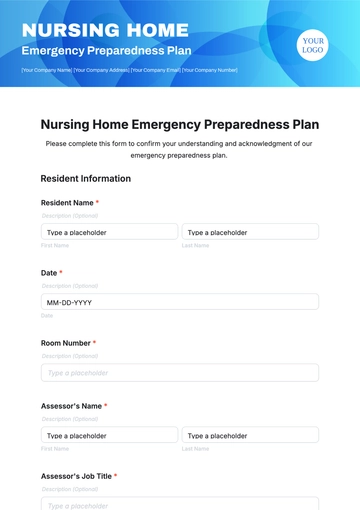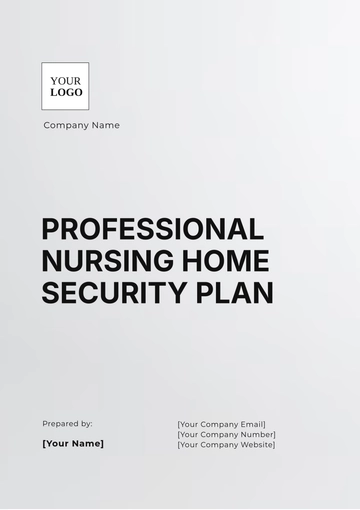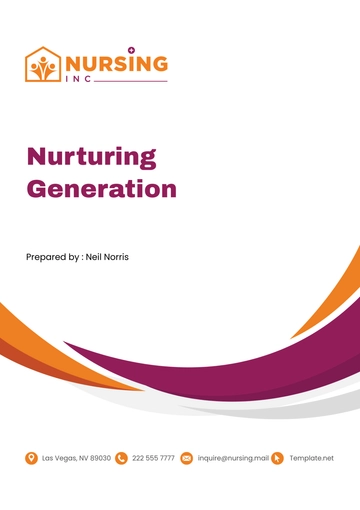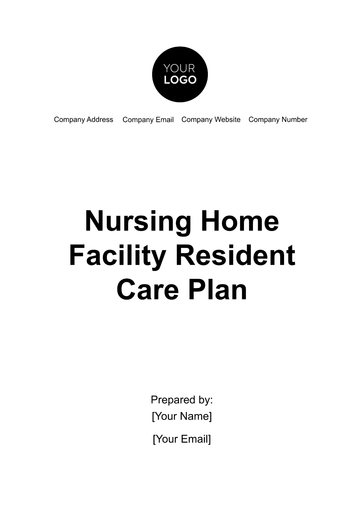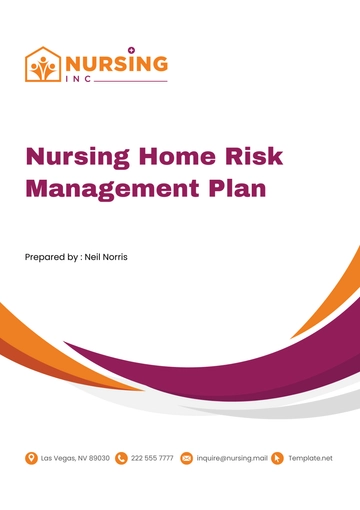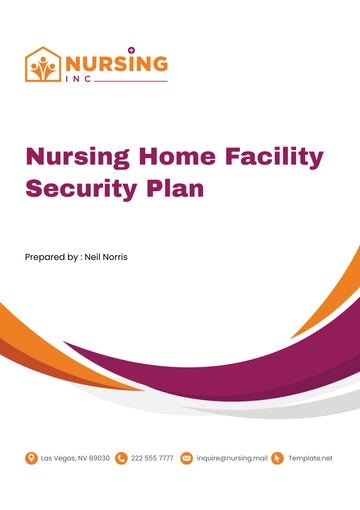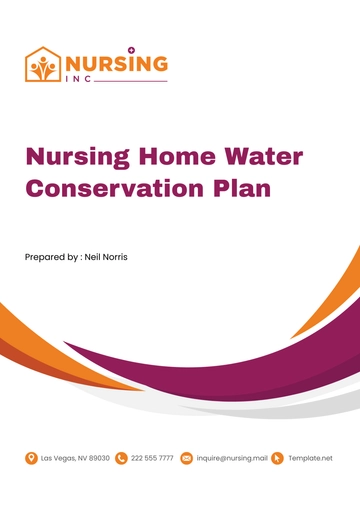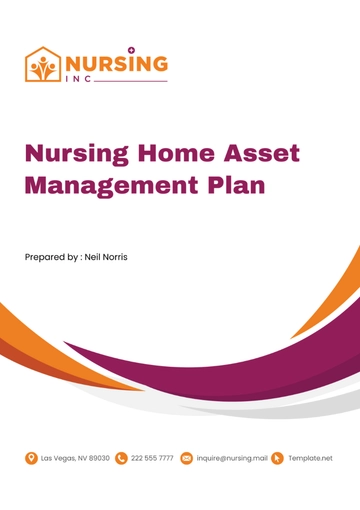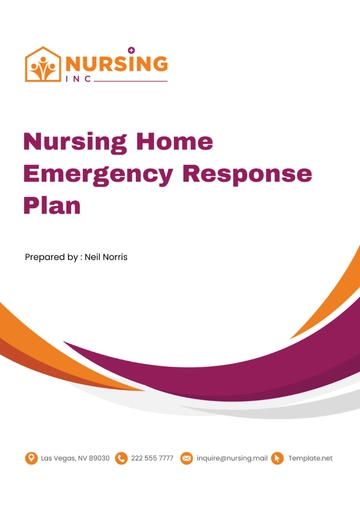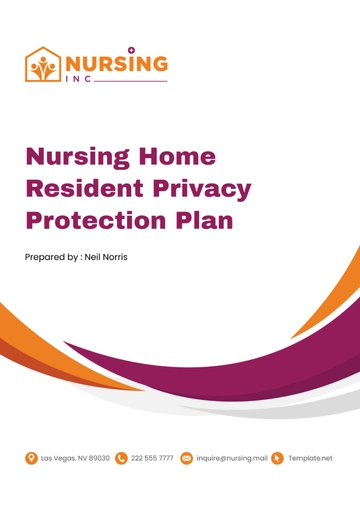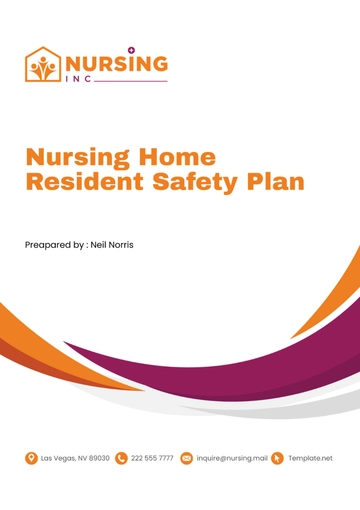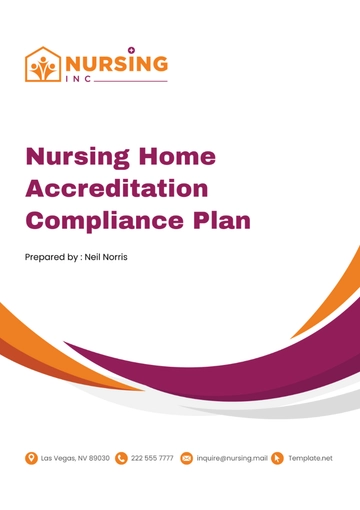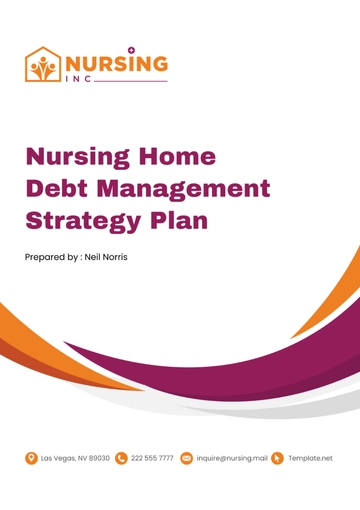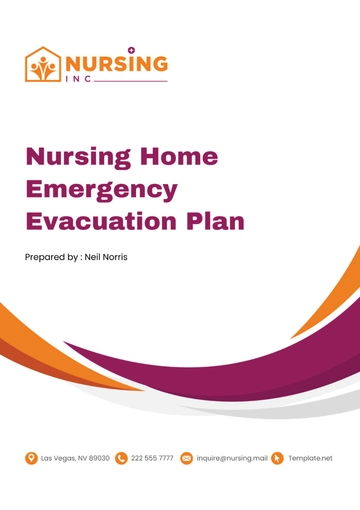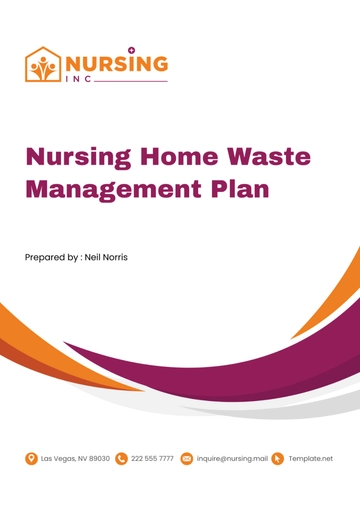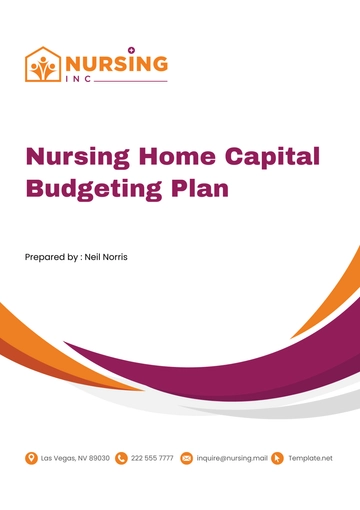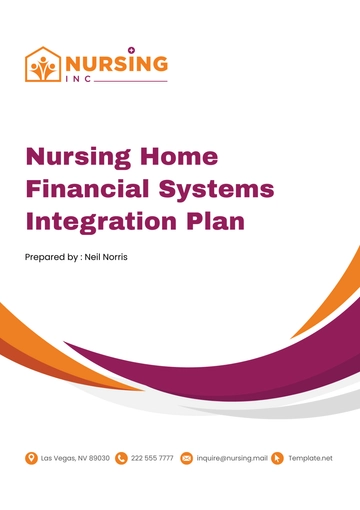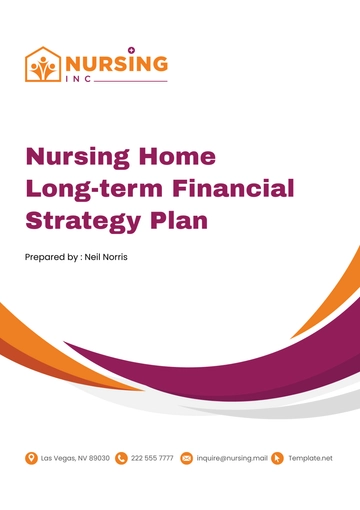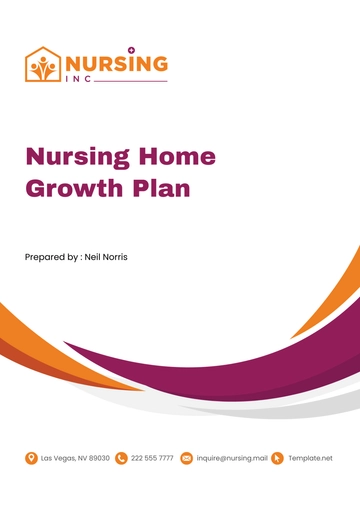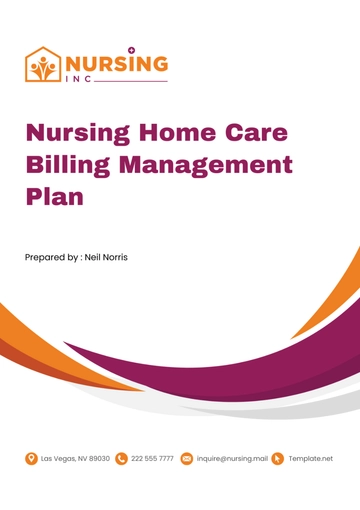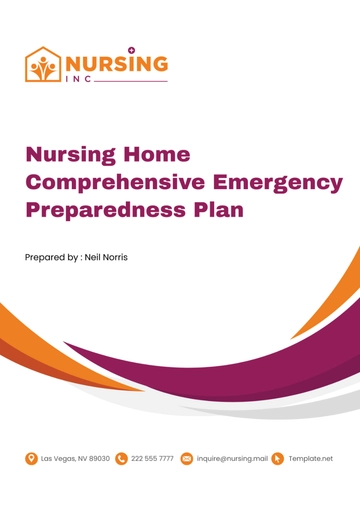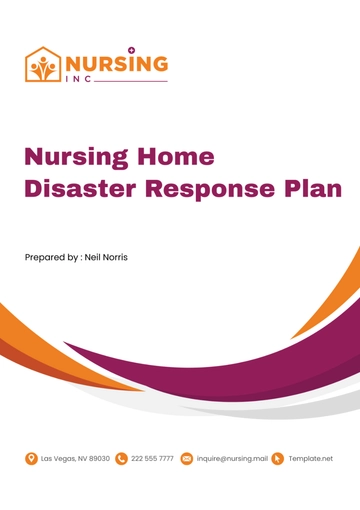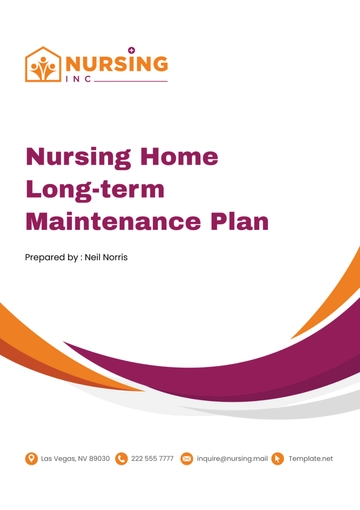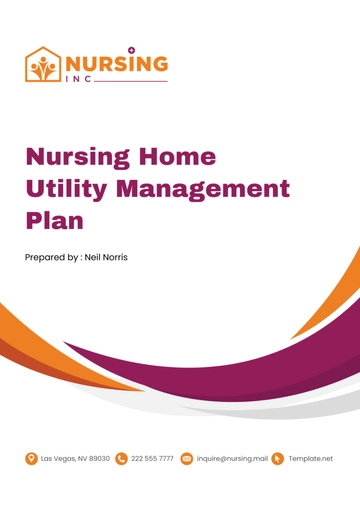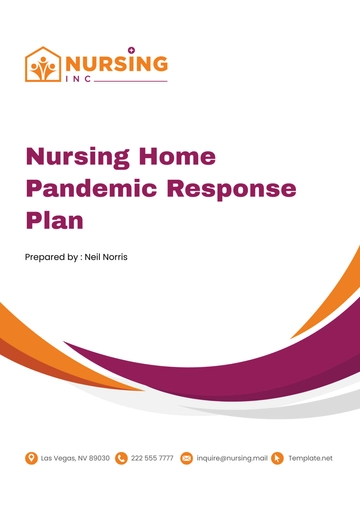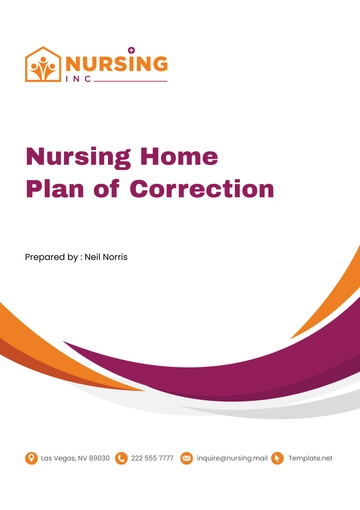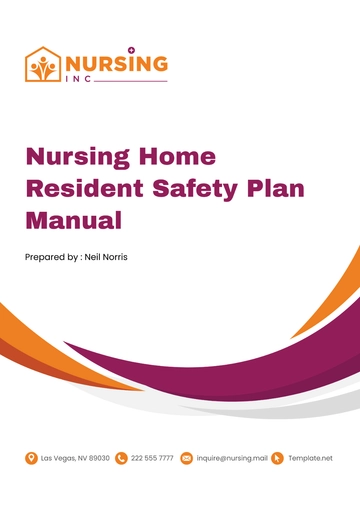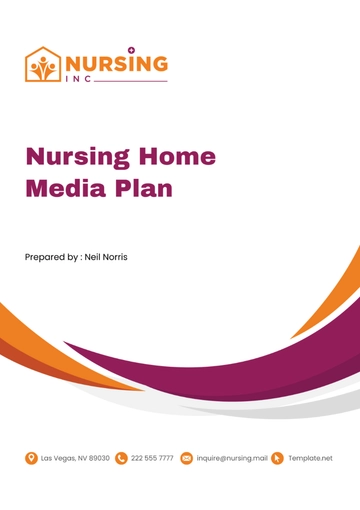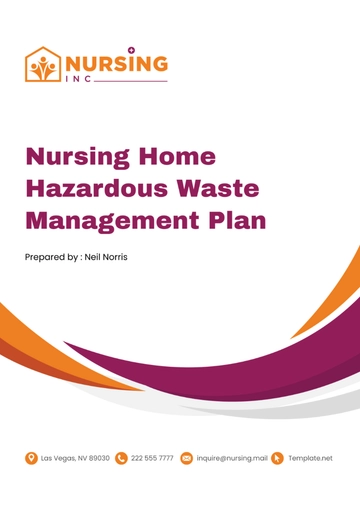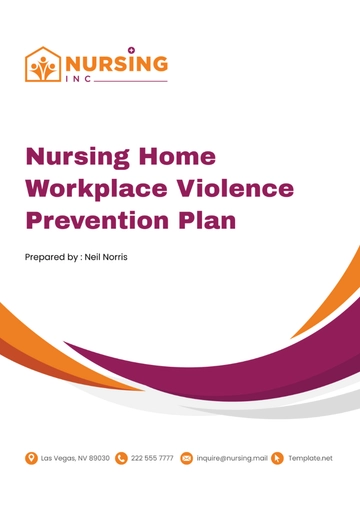Free Nursing Home Training Plan
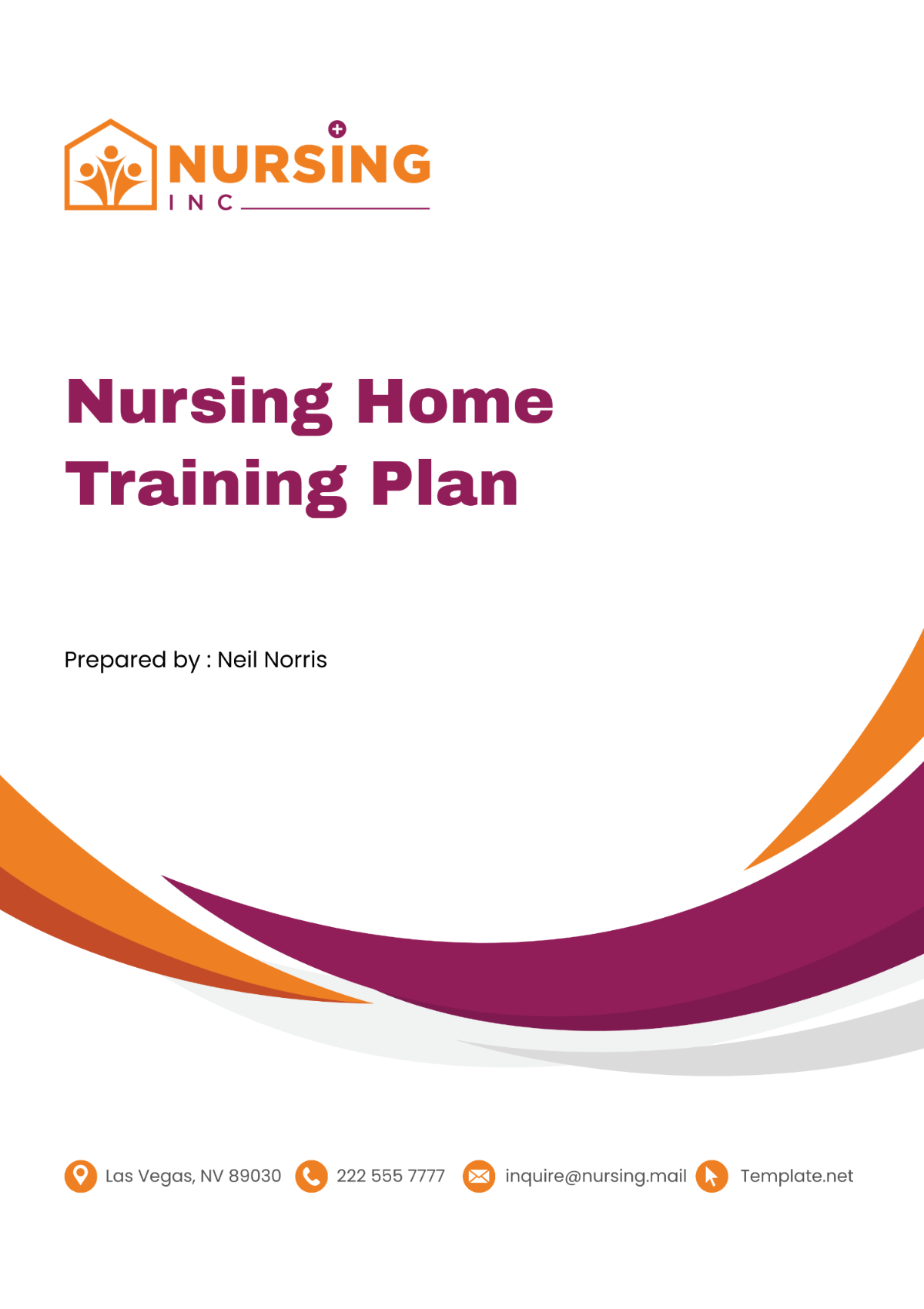
1. Introduction
In the ever-evolving landscape of elder care, our Nursing Home Training Plan is meticulously designed to elevate the standard of care provided to our residents. Anchored in our commitment to continuous learning and improvement, this plan outlines a strategic approach to staff development, ensuring that every team member is equipped with the latest knowledge and skills. From mastering resident care protocols and emergency procedures to refining communication skills and adhering to legal standards, our plan is tailored to foster a culture of professionalism and support, setting a new benchmark for quality care in the industry.
Objectives:
Enhancing Care Quality
At the core of our objectives is the unwavering commitment to enhancing the quality of care for our residents. By meticulously training our staff in the latest resident care protocols and emergency procedures, we aim to not only meet but exceed the standards of elder care, ensuring a safe and nurturing environment for our residents.
Professional Development
We recognize the importance of continuous professional development in maintaining the highest standards of care. Our plan includes regular training sessions focused on the latest best practices in elder care, communication excellence, and compliance with legal and ethical standards, thereby promoting a culture of continuous learning and improvement among our staff.
Fostering a Supportive Environment
Creating a supportive and professional working environment is pivotal to our mission. Through our comprehensive training program, we aim to enhance the skill set of our workforce, enabling them to provide exceptional care while also supporting their professional growth and development.
Continuous Learning and Improvement
In line with our commitment to excellence, our training plan emphasizes the importance of continuous learning and improvement. By keeping our staff abreast of the latest developments in elder care and encouraging a mindset of lifelong learning, we ensure that our residents receive care that is not only compassionate but also cutting-edge.
2. Participants
Our Nursing Home Training Plan is inclusively designed to encompass all facets of our operation, ensuring that every team member, from registered nurses and certified nursing assistants to dietary staff, housekeeping personnel, and administrative staff, is fully equipped to contribute to our environment of exceptional care. This section outlines the diverse roles of our participants, highlighting the comprehensive approach we take to foster a collaborative and skilled workforce.
Participants Overview
Participant Group | Role in Nursing Home | Key Training Focus Areas |
|---|---|---|
Registered Nurses (RNs) | Provide direct care to residents, oversee CNAs, administer medication, and monitor health status. | - Advanced resident care protocols - Medication management and safety - Leadership and team coordination - Legal and ethical standards in nursing care |
Certified Nursing Assistants (CNAs) | Assist RNs, provide basic care and assistance with daily activities. | - Basic care techniques - Infection control and prevention - Effective communication with residents and families - Emergency response procedures |
Dietary Staff | Plan and prepare meals to meet the nutritional needs of residents. | - Nutrition and special diets for the elderly - Safe food handling and preparation - Allergy awareness - Coordination with healthcare providers for dietary planning |
Housekeeping Personnel | Maintain a clean and safe environment for residents, staff, and visitors. | - Infection control and sanitation best practices - Safe use of cleaning chemicals - Handling and disposal of hazardous waste - Privacy and respectfulness in resident spaces |
Administrative Staff | Manage operations, handle admissions, and oversee compliance with healthcare regulations. | - Data privacy and security - Healthcare compliance and regulations - Effective communication and customer service - Record keeping and administrative management |
3. Duration and Schedule
This plan is structured to accommodate the dynamic needs of both new and existing staff, ensuring a seamless integration of cutting-edge care practices and compliance standards. Spanning two weeks for new employees and including quarterly ongoing training alongside an annual refresher course, this schedule is designed to uphold our commitment to excellence in care through continuous education and skill reinforcement. This section delineates the comprehensive training timelines and sessions, tailored to foster an environment of perpetual learning and professional development.
Type of Training | Duration | Scheduled Time |
|---|---|---|
New Employee Training | Two weeks | Orientation and specialized sessions tailored to their specific roles, encompassing both theoretical and practical components to equip new hires with the foundational knowledge and skills required for their positions. |
Ongoing Training | Quarterly | Half-day workshops focused on updates in care practices, legal compliance, and emergency preparedness, ensuring that all staff remain at the forefront of industry standards and best practices. |
Annual Refresher | Two full days | Comprehensive sessions designed to reinforce crucial skills and introduce new advancements in elder care techniques and technologies, thereby ensuring that our team is well-versed in the latest developments and can apply these advancements in their daily responsibilities. |
This framework ensures that every member of our team, regardless of their tenure, receives consistent and comprehensive training that not only meets but exceeds the standards of elder care. Our dedicated approach to ongoing education underscores our pledge to provide unparalleled care and support, while also promoting a culture of growth and excellence among our staff.
4. Methods
Our Nursing Home Training Plan incorporates a diverse array of training methods, each designed to cater to the varied learning styles and needs of our staff. From in-person workshops led by seasoned healthcare professionals to interactive online courses and hands-on simulations, we ensure a comprehensive educational experience. This multi-faceted methodology not only facilitates a deeper understanding of critical care concepts but also enhances the practical skills essential for providing top-tier care to our residents. This section details the rich blend of training methods employed to prepare our staff for excellence in every aspect of their roles.
Training Method | Description | Benefits |
|---|---|---|
In-person Workshops | Expert-led sessions covering a wide array of topics including advanced care techniques, ethical considerations, and teamwork dynamics within the healthcare setting. | Enables real-time interaction and feedback, fosters a sense of community among participants, and allows for immediate clarification of complex concepts. |
Online Courses | A curated selection of online learning modules ranging from infection control and resident rights to the latest in elder care technology. | Offers flexibility in scheduling, caters to individual learning paces, and provides access to a vast resource of updated information. |
Hands-on Practical Simulations | Scenario-based simulations of emergency procedures and routine care tasks, conducted in a controlled environment to mirror real-life situations. | Enhances practical skills through experiential learning, improves critical thinking and decision-making in emergency situations, and boosts confidence in care delivery. |
Educational Materials for Self-Study | Comprehensive resources including manuals, articles, and video tutorials made available for personal study, allowing staff to deepen their understanding at their own pace. | Supports continuous learning, enables staff to revisit concepts as needed, and supplements formal training sessions with in-depth material. |
Through this blend of training methods, we create a dynamic and engaging learning environment that not only imparts essential knowledge and skills but also promotes a culture of continuous improvement and excellence. Our commitment to employing varied educational techniques ensures that our staff is well-prepared to meet the challenges of elder care with competence and compassion.
5. Resources
[Your Company Name] employs an extensive suite of training resources designed to empower our staff with the knowledge and skills necessary for exemplary service. This array, encompassing in-person workshops, online courses, practical simulations, and a wealth of educational materials, forms the backbone of our comprehensive Nursing Home Training Plan. Each resource is carefully selected and developed to ensure our team has access to the best tools for their professional growth and the wellbeing of our residents. This section provides an in-depth look at the resources that make our training program both effective and impactful.
Resource Type | Resource Description | Utilization in Training Program |
|---|---|---|
In-person Workshops | Healthcare professional-led workshops covering a broad spectrum of topics from advanced care protocols to team dynamics and ethical care practices. | These sessions provide an interactive environment for staff to engage with experts, fostering a hands-on learning experience that promotes practical understanding and teamwork. |
Online Courses | A diverse range of online courses, including subjects like infection control, resident rights, and updates in elder care technology. | Online courses offer flexibility and convenience, allowing staff to learn at their own pace and time, ensuring that training is comprehensive and accessible to all, regardless of their schedules. |
Practical Simulations | Hands-on simulation training that replicates real-life emergency situations and routine care scenarios, designed to hone practical care delivery skills. | Simulations play a critical role in our training program, offering staff the opportunity to apply theoretical knowledge in a controlled, realistic environment, thereby enhancing their competence and confidence in critical care delivery. |
Educational Materials | A collection of manuals, instructional videos, and other materials for self-guided study on various aspects of elder care. | These resources support continuous learning and personal development, allowing staff to deepen their understanding of care principles and practices at their own pace and convenience. |
Leveraging these resources, [Your Company Name] is committed to nurturing a highly skilled and knowledgeable workforce, capable of delivering the highest standards of care to our residents. Our multifaceted approach to training ensures that our staff are not only prepared to meet the demands of their roles but are also equipped to exceed them, reflecting our dedication to excellence in every facet of our operation.
6. Assessments
Assessments form a pivotal part of our Nursing Home Training Plan, serving as both a benchmark for excellence and a tool for continuous improvement. Through a structured series of evaluations, ranging from initial skill assessments for new employees to comprehensive annual reviews, we meticulously gauge the efficacy of our training programs. These assessments are designed not just to measure competence but also to identify opportunities for further development, ensuring our staff's abilities align with the highest standards of elder care. This section delves into the various assessment strategies we employ to maintain and elevate our team's performance.
Assessment Type | Frequency/Timing | Description and Focus |
|---|---|---|
Initial Skill Assessment | During Onboarding Process | A thorough evaluation of new employees' pre-existing skills and knowledge, aimed at identifying baseline competencies and tailor the orientation and training programs to individual needs. |
Quarterly Skill Evaluation | Quarterly | Focused assessments to review the practical application of learned skills and the integration of new knowledge, ensuring that training is translated into effective care practices. |
Annual Comprehensive Assessment | Annually | A holistic review of each staff member's overall competency, progress, and areas for improvement, measured against predefined benchmarks to foster personal and professional growth. |
Emergency Response Evaluation | During Annual Refresher Courses | Specific evaluations of emergency preparedness and response skills, crucial for ensuring the safety and well-being of residents and staff in critical situations. |
These multifaceted assessments are integral to [Your Company Name]'s commitment to excellence in elder care. By systematically evaluating our staff's performance and progression, we ensure that our training initiatives are not only impactful but also evolve in tandem with the latest industry standards and best practices. This proactive approach to assessment underscores our dedication to nurturing a workforce that is competent, confident, and fully equipped to meet the challenges of modern elder care with unparalleled expertise and compassion.
7. Progress Tracking
At [Your Company Name], we understand that the journey towards excellence in elder care is ongoing, and systematic progress tracking is vital to this process. Our approach to monitoring training outcomes extends beyond mere completion, focusing on the application of skills and the tangible improvement of our staff's performance. By recording each employee's development journey and responding proactively to areas needing enhancement, we ensure that our training program remains dynamic and impactful. This section outlines our comprehensive strategy for tracking progress, aimed at fostering a culture of continuous learning and adaptation to the evolving needs of our residents and the elder care industry.
Component | Description | Implementation Strategy |
|---|---|---|
Systematic Recording | Detailed logging of each employee's training activities, assessments, and feedback sessions, creating a personalized training history that reflects their growth and learning trajectory. | Utilize a digital training management system to maintain accurate and accessible records of all training activities and assessment outcomes for each employee. |
Identification of Weaknesses | Active identification of areas where employees may struggle or lack proficiency, based on assessment results and supervisor observations. | Employ analytical tools within the training management system to highlight skill gaps and areas requiring additional focus. |
Tailored Additional Training | Provision of supplementary training sessions and resources to specifically address identified weaknesses, ensuring that all staff achieve the required competency levels. | Design targeted training modules and provide access to extra learning materials or one-on-one coaching sessions for employees needing further development in specific areas. |
Efficacy Measurement | Evaluation of how effectively the learned skills and knowledge are applied in the actual care setting, measuring the impact of training on the quality of care provided to residents. | Implement performance metrics and feedback mechanisms to assess the real-world application of training, with direct observations and resident care outcomes serving as key indicators of success. |
Regular Review and Refinement | Continuous review of progress tracking data to inform the ongoing development of employees and the iterative refinement of the training program, ensuring it remains aligned with industry standards and the evolving needs of the workforce. | Schedule periodic strategy sessions involving training coordinators, department heads, and HR to analyze progress data, discuss insights, and plan necessary adjustments to the training curriculum. |
Through this structured and responsive progress tracking framework, [Your Company Name] not only ascertains the effectiveness of its training program but also reinforces its dedication to excellence and innovation in elder care. By continually adapting our training strategies to meet the needs of our staff and residents, we uphold our commitment to providing the highest standard of care and support in the industry.
8. Evaluation and Adjustments
Recognizing the multifaceted nature of training effectiveness, our strategy encompasses feedback loops, performance metrics analysis, and a commitment to continuous improvement. By engaging both participants and instructors in the evaluative process and measuring real-world outcomes, we ensure that our training initiatives are both impactful and aligned with our high standards of care. This section outlines our structured approach to evaluating and refining our training program, guaranteeing it remains responsive to the needs of our staff and residents alike.
Evaluation Component | Description | Adjustment Strategy |
|---|---|---|
Participant and Instructor Feedback | Immediate post-session feedback collected from both trainees and trainers to gauge the session's relevance, engagement, and knowledge transfer. | Utilize surveys and focus groups to gather qualitative and quantitative feedback, informing adjustments to content delivery, format, and trainer selection. |
Performance Metrics Comparison | Analysis of key performance indicators (KPIs) related to care quality, efficiency, and staff satisfaction before and after training interventions, to directly measure the training's impact. | Employ data analytics to identify trends and shifts in performance metrics, pinpointing areas of success and opportunities for improvement. |
Continuous Program Review | Ongoing assessment of the training program's alignment with organizational goals, industry standards, and the evolving needs of the elder care sector. | Schedule regular review meetings with the training team, HR, and department heads to discuss the program's effectiveness and integrate industry best practices. |
Responsive Adjustments | Implementation of data-driven adjustments to the training curriculum, methods, and resources based on comprehensive evaluations to enhance future training efficacy. | Develop a structured process for integrating feedback and performance insights into curriculum development, ensuring the training remains cutting-edge and relevant. |
Through this iterative process of evaluation and adjustment, [Your Company Name] not only measures the immediate impact of our training efforts but also fosters an environment of ongoing development and excellence. Our commitment to refining our training plan based on direct feedback and performance outcomes ensures that our staff are well-equipped to meet the complex needs of our residents, reflecting our dedication to leadership in the elder care sector.
- 100% Customizable, free editor
- Access 1 Million+ Templates, photo’s & graphics
- Download or share as a template
- Click and replace photos, graphics, text, backgrounds
- Resize, crop, AI write & more
- Access advanced editor
Discover the Nursing Home Training Plan Template from Template.net. This rich, editable and customizable tool simplifies the process of creating detailed training plans for elderly care facilities. Tailored to suit any need, the template is conveniently editable in our Ai Editor Tool. With its professional design and user-friendly features, it significantly reduces the planning time. This high-quality template from Template.net is an essential instrument for ensuring efficient, organized, and successful training sessions. Leverage the power of our template to elevate your nursing home's standards today.
You may also like
- Finance Plan
- Construction Plan
- Sales Plan
- Development Plan
- Career Plan
- Budget Plan
- HR Plan
- Education Plan
- Transition Plan
- Work Plan
- Training Plan
- Communication Plan
- Operation Plan
- Health And Safety Plan
- Strategy Plan
- Professional Development Plan
- Advertising Plan
- Risk Management Plan
- Restaurant Plan
- School Plan
- Nursing Home Patient Care Plan
- Nursing Care Plan
- Plan Event
- Startup Plan
- Social Media Plan
- Staffing Plan
- Annual Plan
- Content Plan
- Payment Plan
- Implementation Plan
- Hotel Plan
- Workout Plan
- Accounting Plan
- Campaign Plan
- Essay Plan
- 30 60 90 Day Plan
- Research Plan
- Recruitment Plan
- 90 Day Plan
- Quarterly Plan
- Emergency Plan
- 5 Year Plan
- Gym Plan
- Personal Plan
- IT and Software Plan
- Treatment Plan
- Real Estate Plan
- Law Firm Plan
- Healthcare Plan
- Improvement Plan
- Media Plan
- 5 Year Business Plan
- Learning Plan
- Marketing Campaign Plan
- Travel Agency Plan
- Cleaning Services Plan
- Interior Design Plan
- Performance Plan
- PR Plan
- Birth Plan
- Life Plan
- SEO Plan
- Disaster Recovery Plan
- Continuity Plan
- Launch Plan
- Legal Plan
- Behavior Plan
- Performance Improvement Plan
- Salon Plan
- Security Plan
- Security Management Plan
- Employee Development Plan
- Quality Plan
- Service Improvement Plan
- Growth Plan
- Incident Response Plan
- Basketball Plan
- Emergency Action Plan
- Product Launch Plan
- Spa Plan
- Employee Training Plan
- Data Analysis Plan
- Employee Action Plan
- Territory Plan
- Audit Plan
- Classroom Plan
- Activity Plan
- Parenting Plan
- Care Plan
- Project Execution Plan
- Exercise Plan
- Internship Plan
- Software Development Plan
- Continuous Improvement Plan
- Leave Plan
- 90 Day Sales Plan
- Advertising Agency Plan
- Employee Transition Plan
- Smart Action Plan
- Workplace Safety Plan
- Behavior Change Plan
- Contingency Plan
- Continuity of Operations Plan
- Health Plan
- Quality Control Plan
- Self Plan
- Sports Development Plan
- Change Management Plan
- Ecommerce Plan
- Personal Financial Plan
- Process Improvement Plan
- 30-60-90 Day Sales Plan
- Crisis Management Plan
- Engagement Plan
- Execution Plan
- Pandemic Plan
- Quality Assurance Plan
- Service Continuity Plan
- Agile Project Plan
- Fundraising Plan
- Job Transition Plan
- Asset Maintenance Plan
- Maintenance Plan
- Software Test Plan
- Staff Training and Development Plan
- 3 Year Plan
- Brand Activation Plan
- Release Plan
- Resource Plan
- Risk Mitigation Plan
- Teacher Plan
- 30 60 90 Day Plan for New Manager
- Food Safety Plan
- Food Truck Plan
- Hiring Plan
- Quality Management Plan
- Wellness Plan
- Behavior Intervention Plan
- Bonus Plan
- Investment Plan
- Maternity Leave Plan
- Pandemic Response Plan
- Succession Planning
- Coaching Plan
- Configuration Management Plan
- Remote Work Plan
- Self Care Plan
- Teaching Plan
- 100-Day Plan
- HACCP Plan
- Student Plan
- Sustainability Plan
- 30 60 90 Day Plan for Interview
- Access Plan
- Site Specific Safety Plan
